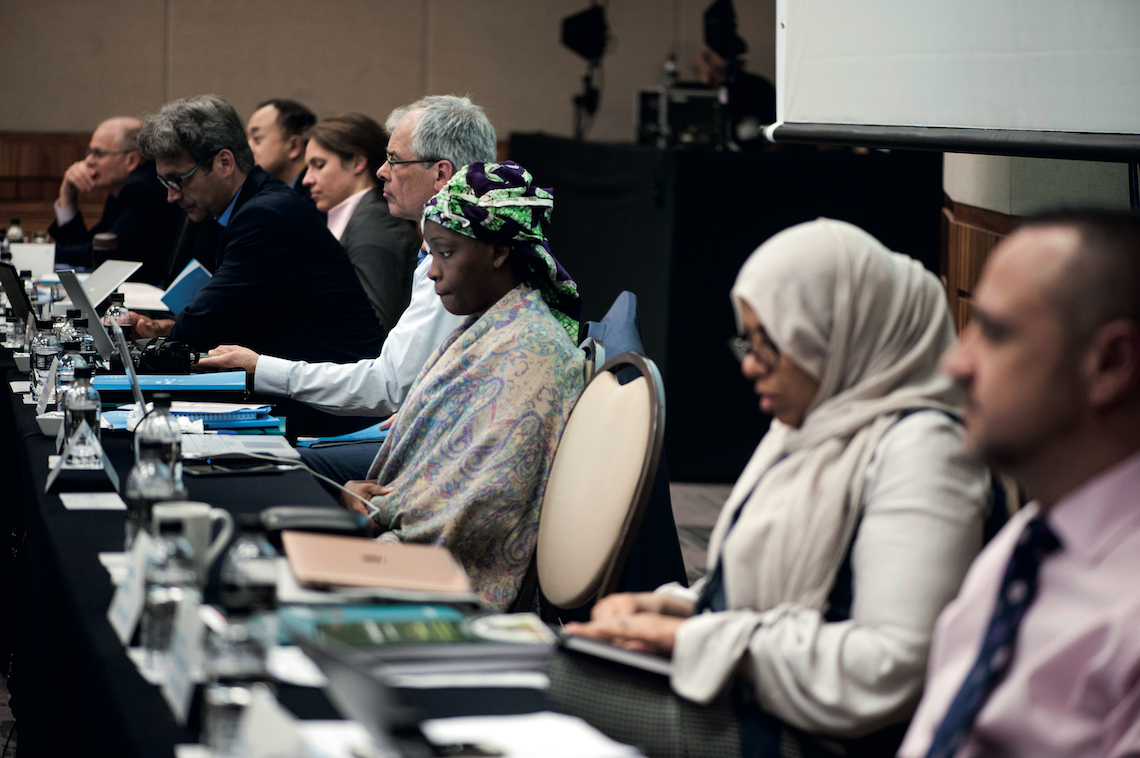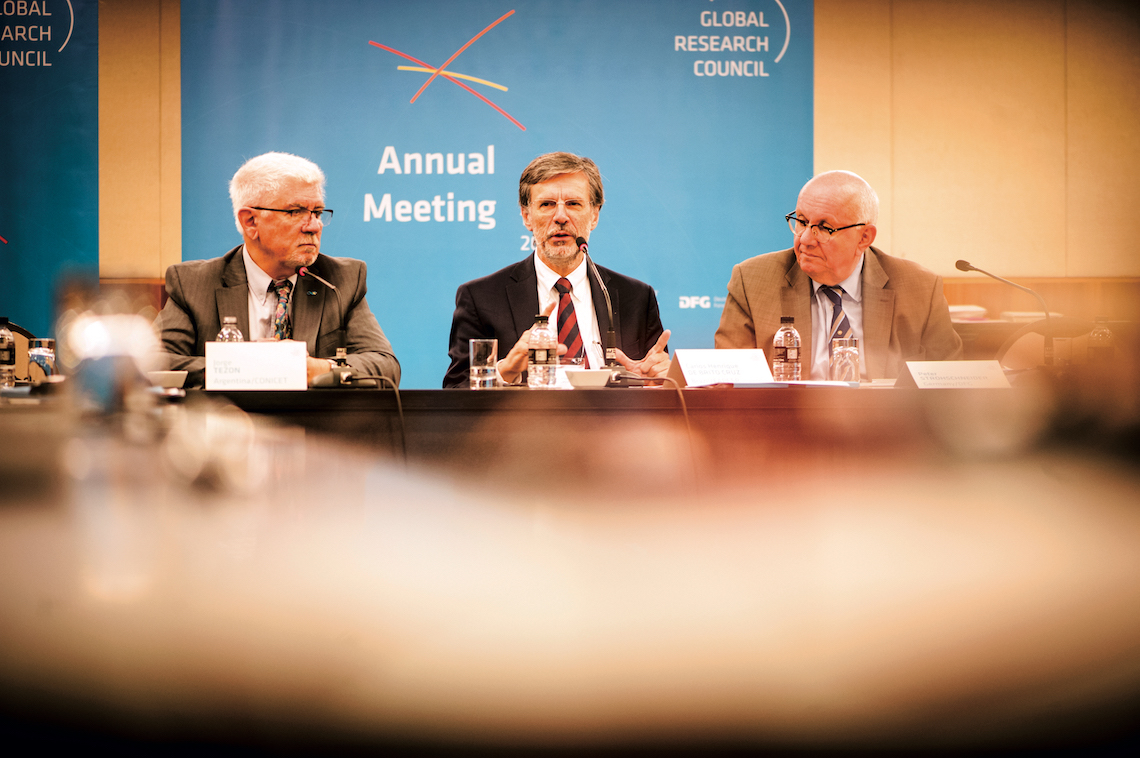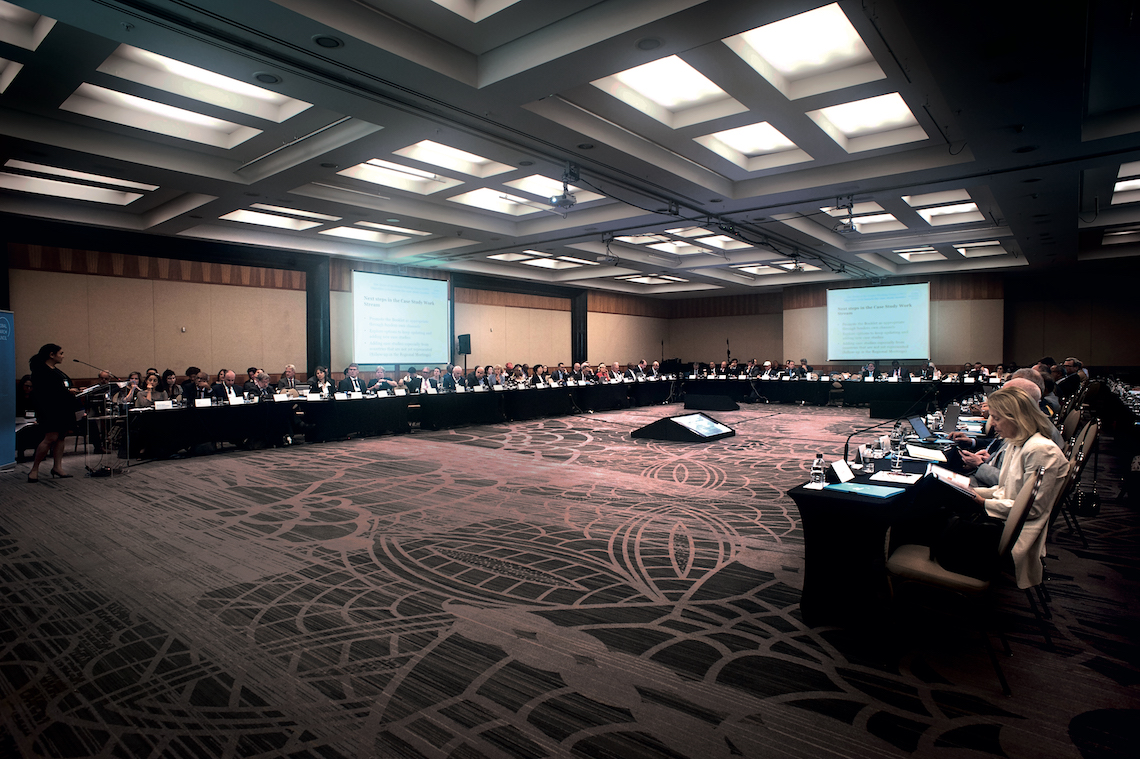Around 50 representatives of research organizations from 45 countries met in São Paulo from May 1 to 3 to discuss science funding policies and share experiences at the 8th Annual Meeting of the Global Research Council (GRC), an organization created in 2012 to promote cooperation between research agencies and encourage good management practices. The meeting was jointly organized by FAPESP, the National Scientific and Technical Research Council of Argentina (CONICET), and the German Research Foundation (DFG).
The theme of this year’s event was the challenge of responding to growing expectations among governments and the public that research should have societal and economic benefits—and of dealing with the pressure to select projects and analyze results based on potential impact. In recent years, evaluation systems have faced increasing demands to measure the positive effects of research more broadly. Instead of focusing exclusively on research quality, the robustness of results, and the skills of the researchers—long-established elements for guiding the advance of science—funding criteria have begun to consider other factors, such as the potential to contribute to public policy, be used in commercial applications, or improve quality of life.
A statement of principles endorsed by the event participants demonstrates the nuances of the challenge they face. The document notes that while no research is impact-free, the impact of research can come in many forms, such as advancing knowledge, developing professional skills, and producing new innovations. While the signatories understand the natural pressure for public research investment to produce tangible results, they highlight that impact is not always predictable—research can have a smaller or greater impact than expected, and impacts can take longer than desired to materialize. They emphasize that divergences between expectations and reality do not represent a weakness in science and technology systems, nor are they a sign of poor research quality.

Léo Ramos Chaves
Funding agencies from 45 countries participated in three days of discussionLéo Ramos ChavesPhysicist Carlos Henrique de Brito Cruz, scientific director of FAPESP, pointed out that research benefits sometimes take time to become clear, citing Google as an example of the difficulty of measuring impact. “The two founders received funding from the National Science Foundation (NSF) in 1994 as part of a program aimed at creating digital libraries and book classification methods. In 1998, they developed their algorithm for ranking web pages. In 1999, they tried to sell the company for US$1 million, but nobody was interested. They lowered the price to US$700,000. Still there were no buyers. If we had assessed the impact of Google at that time, it would have been considered a complete failure,” said Brito Cruz, who was elected chair of the GRC Governing Board at the meeting.
Astrophysicist France Córdova, director of the NSF, which is the leading basic research funding agency in the USA, emphasized that it is more valuable to demonstrate the public importance of a project than to try to guess what impact it might have. According to Córdova, concern about the benefits of science permeates the work of researchers. “About 50% of the proposals we receive mention impacts such as increasing the representation of women or people with low socioeconomic status. Or they present new strategies for educating the next generation,” she says.
Conscious societies
According to the statement of principles, responding positively to expectations of societal and economic impact is an important way of increasing public awareness of the benefits of science and making better use of public funding. “To some extent, the successes of science have led nations to believe in the power of knowledge to develop their societies,” said biologist Molapo Qhobela, CEO of the National Research Foundation of South Africa. “So as we show that this power can change people’s lives, they expect this to happen and demand more.”
A broad knowledge base in all fields allows us to face new societal challenges when they emerge
The primary objective is to find a balance between responding to demands for a return on public investment by funding research that can have a societal and economic impact, and encouraging research that focuses on advancing knowledge. “As well as societal and economic returns, we also have to consider the virtue of curiosity-driven research that aims to push the boundaries of knowledge—both elements are essential to the development of vibrant national research ecosystems,” said German philologist Peter Strohschneider, president of the DFG.
The GRC argues that scientific merit should be the priority when selecting projects for funding, and recommends creating separate evaluation procedures for excellence and impact. The statement recognizes that societal and economic benefit is a valuable criterion for use-oriented research, but warns that adopting it indiscriminately can have undesired side effects, such as preventing researchers from proposing broad or risky projects out of fear that they will fail to secure funding.
Ecologist Klement Tockner, president of the Austrian Science Fund (FWF), explained that the institution has refused to adopt social impact as a project-selection criterion because it would compromise researchers’ impetus to take risks and the agency’s aim of investing in transdisciplinary research. “We believe our responsibility is to promote research of the highest quality and excellence,” he said, noting that Austria has another funding agency dedicated to applications of science.

Léo Ramos Chaves
Tezon of CONICET, Brito Cruz of FAPESP, and Strohschneider of the DFG all spoke at the eventLéo Ramos ChavesThe statement of principles underscores the need to invest in research from all fields, including those that may not stir so much interest among the general public at a particular time. This is because the nature of the challenges faced by society can change over time, and we must be prepared for all of them. “Maintaining a broad knowledge base is a prerequisite to be able to quickly and adequately respond when new societal challenges emerge,” the paper said.
Various other matters were discussed at the meeting. Representatives of Latin American research agencies talked about the need to increase funding for the maintenance of major scientific infrastructure such as Sirius, a new synchrotron light source in Campinas, Brazil, which is close to completion, and the Argentine Neutron Beam Laboratory (LAHN) in Ezeiza, in the Metropolitan Region of Buenos Aires. “Maintenance costs are very high. Funds will have to be obtained from a variety of sources to ensure these facilities remain permanently available to the Latin American and international scientific community. This will require greater cooperation between the funding agencies in the region,” said Jorge Tezon, development manager at CONICET, Argentina’s biggest research-funding agency.
The importance of increasing the number of women in scientific research was also addressed. The GRC’s Gender Working Group compiled 53 cases of how the participation of women has been promoted across 28 countries. One example was the NSF, which since 2001 has invested US$315 million into improving gender equality and inclusion in the US scientific workforce. New Zealand’s Health Research Council has managed to increase the number of female candidates in one of its programs by 16% by investing in strategies that prevent gender bias during project evaluation. In another initiative, the National Natural Science Foundation of China (NSFC) has raised the age limit for participating in two of its programs to 40. As a result, the number of female applicants increased by 51%—it is well-known that motherhood tends to delay a researcher’s career. “The case studies provide an overview of the current status of women’s participation in scientific research and offer guidance on how to promote it,” said mathematician Phethiwe Matutu of the National Research Foundation of South Africa.
Open access
The meeting was also used as an opportunity to present and discuss open-access initiatives. Brazil demonstrated the scope of its online library SciELO, which was created in 1997 and now provides free access to almost 300 scientific journals. Colleen Campbell, a researcher at the Max Planck Digital Library, presented the Open Access 2020 Initiative, which aims to reallocate funds currently spent on journal subscriptions to instead support sustainable open-access business models. Arianna Becerril, director of the Network of Scientific Journals of Latin America and the Caribbean, Spain and Portugal (REDALYC)—a digital library that adopts a similar model to SciELO—spoke about AmeliCA, a platform designed to promote open access in Latin America and the Southern Hemisphere, while Molapo Qhobela presented the African Open Science Platform, built to facilitate research collaboration. “We, the research funders, cannot solve the issue of open access alone, but we are an essential element and we must work together and take responsibility for our role in the academic system,” said David Sweeney, president of Research England, a branch of the UK’s leading research-funding agency, UK Research and Innovation, which promotes the transfer of scientific knowledge to society. Sweeney presented Plan S, the EU initiative supported by a group of funding agencies through which all scientific articles resulting from publicly funded research must be published exclusively via open access from 2021 onwards.
The GRC meeting in São Paulo was the first to be held in Brazil. The three previous meetings took place in Moscow, Russia, Ottawa, Canada, and New Delhi, India. The next will be held in Durban, South Africa, in May 2020, and will address public engagement with science and research and how to respond to regional and global challenges.
Republish

